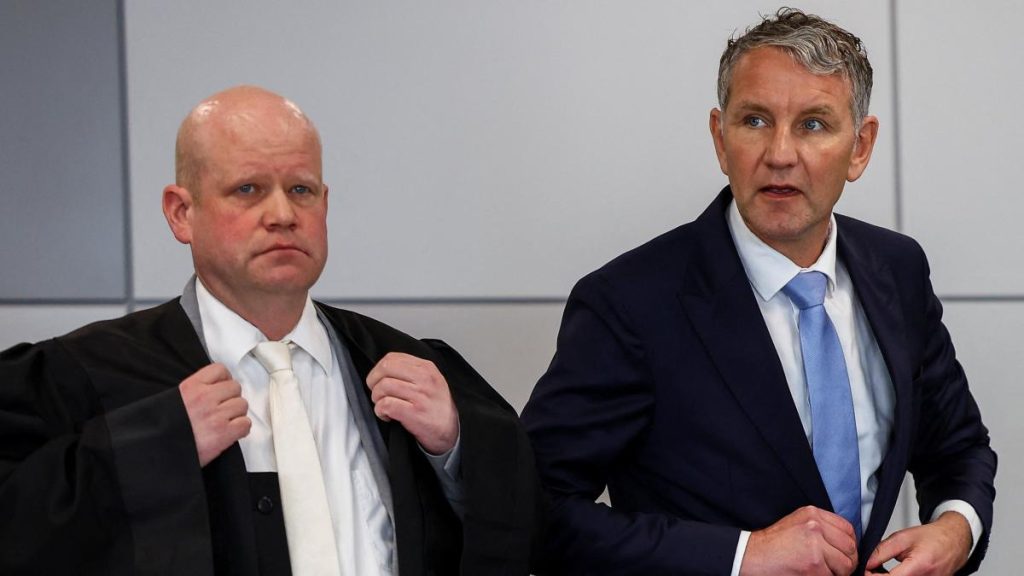The start of the trial against AfD politician Björn Höcke was significantly delayed on Thursday due to various requests and complaints from the defense. Höcke’s lawyers had requested that the trial be fully documented by audio recording. They also demanded that the Federal Constitutional Court decide whether the Regional Court in Halle or the Magistrate’s Court in Merseburg is responsible for the trial. The interruptions by the defense occurred before the indictment was read. The presiding judge and the chamber had rejected the request for recording the proceedings by decision. The decision of the chamber regarding the involvement of the Federal Constitutional Court was still pending before the lunch break, two and a half hours after the official start of the first day of the trial. The prosecution expressed frustration with the defense’s actions. State prosecutor Benedikt Bernzen said he had never experienced something like this before. Court spokesperson Adina Kessler-Jensch said it was possible that the trial in Halle would continue even if the request for the Federal Constitutional Court to decide on jurisdiction was granted.
Prior to the start of the trial, numerous opponents of the politician had gathered in front of the courthouse in Halle. The police initially reported around 260, then 570 people. Groups such as “Halle against the Right” and the “Association of the Persecuted of the Nazi Regime – Union of Antifascists” had called for demonstrations. Many participants carried pre-printed or hand-painted signs calling the 52-year-old a “Nazi”. The Thuringian AfD leader Höcke is accused of using symbols of unconstitutional and terrorist organizations. Specifically, it relates to a speech in which the 52-year-old is said to have used a banned slogan of the Stormtroopers (SA), the paramilitary combat organization of the NSDAP. Höcke had defended his choice of words shortly before the trial began.
The punishment for using symbols of unconstitutional and terrorist organizations ranges from a fine to a prison sentence of three years. At the opening of the trial, in addition to protesters, many media representatives were present. According to the police, court operations were normal despite the gathering. Access was granted, and the situation was peaceful. Initially, four dates were scheduled for the trial under the chairmanship of Judge Jan Stengel. A verdict could be announced on May 14, according to the Regional Court. In the state elections in Thuringia on September 1, Höcke plans to run as the AfD’s lead candidate. The party of the former history teacher is classified as reliably right-wing extremist by the state constitution protection.
The charges against Höcke include using the banned SA slogan “Everything for Germany!” in a speech in Merseburg in May 2021, and using the phrase at an AfD event in Gera in the previous December. He now faces charges of using symbols of unconstitutional and terrorist organizations. The penalty in such cases ranges from a fine to a prison sentence of three years. Until a possible conviction, the presumption of innocence applies. Four trial dates have been set so far. Höcke defended his choice of words in a televised debate with the Thuringian CDU top candidate Mario Voigt a week before the trial began.
Höcke also commented on the planned trial a few days before the televised debate. In a post written in English on X, formerly Twitter, he stated that he was accused of misrepresenting a quote in which he expressed his patriotism. Several X users, including platform owner Elon Musk, reacted to his post. Musk asked for clarification on what Höcke said and why it was illegal. Normally, Höcke writes his X posts in German. If Höcke were to be convicted following certain conditions, the court could indeed decide to temporarily deprive him of his active and passive voting rights. This would be based on section 92a in conjunction with section 45 of the Criminal Code. These are consequences that a court could impose for certain offenses without the need for a separate procedure. It is at the discretion of the court whether to impose these consequences.
If Höcke were to be convicted and sentenced to a minimum of six months in prison, the court could also rule that he is not eligible to vote or hold public office for a maximum of five years. This could potentially impact his candidacy in the upcoming election. While a possible conviction would have no internal consequences within the party, according to party statutes, individuals who have lost their voting rights due to a court ruling cannot be members of a party. However, it is currently uncertain whether Höcke will be convicted and what the sentence would be. This could potentially affect his position as head of the AfD state association if he were to be convicted.


